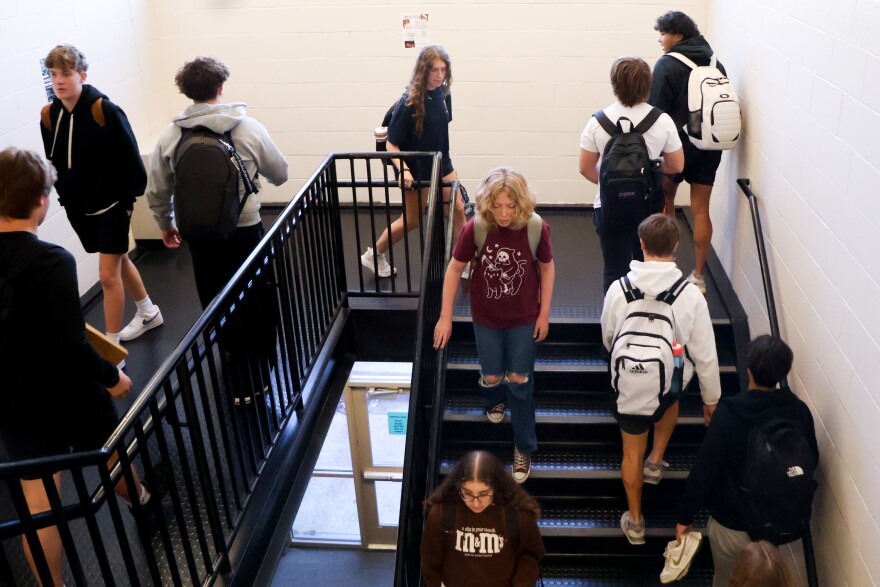The cafeteria is a little louder these days at Rockwood Summit High School in Fenton.
Students are talking with each other as they scarf down lunch, as opposed to turning their phones on their sides and popping in AirPods to watch the latest episode of "The Summer I Turned Pretty" or to scroll through TikTok.
Sean Torgoley, a science teacher who has taught at Rockwood Summit for at least a decade, said he was skeptical about the full-out ban at first.
"I am not even gonna lie, I was a little bit of a hater. I thought it was going to be unrealistic, but so far, it's been really good," Torgoley said.
He's noticed the students are paying more attention in class, but he's most excited that a classroom feels and sounds like a classroom again.
"Whenever I give them a little bit of free time, it's so much louder now, because they are conversing, talking, getting together, they're moving tables and then [there's] even a little bit of horseplay," Torgoley said. "But honestly, I kind of love it."
A new law signed by Governor Mike Kehoe in July mandates that all public schools, including charter schools, develop and implement a policy that restricts cell phones and other personal electronic devices that allow students to communicate with each other during the entirety of the day.
The law outlines some exceptions. Students can use their personal device in case of an emergency, for medical purposes or to support them in their individualized education plans, or IEPs.
Schools are also expected to outline a plan for discipline in case a student repeatedly breaks protocol. At Rockwood, that means a referral to the principal's office, contacting parents, confiscating devices and possible in-school detention or suspension.

School districts also have some wiggle room to determine how they would like students to store their phones.
In the Ferguson-Florissant School District, which implemented a partial ban on cell phones in the 2023-2024 school year, some buildings have been using magnetic pouches to store their phones that lock at the start of the day and reopen as students leave.
The policy got mixed reviews, as some students found ways to damage the pouches to get to their phones.
At Rockwood Summit, students must stow their devices in their backpacks, so they're easy to reach in case of an emergency or a preapproved reason.
Missouri joins over 30 states and the District of Columbia, including neighboring Illinois, that have implemented some form of restrictions on cell phones and other devices during the school day.
A recent study from the Pew Research Center found that 74% of U.S. adults say they would support banning cell phone use during class for middle and high school students.
In Missouri, a St. Louis University and YouGov poll in February found that over 70% of the 900 likely voters supported public schools prohibiting access to cell phones during instructional time.
The transition to the new policy was easier in the Rockwood School District because it had already been piloting a partial ban on phones last year, according to Superintendent Curtis Cain.

Students were allowed to use their phones during passing periods, lunch time and in class with a teacher's permission.
Rockwood also provides Chromebooks for each student in the district and is looking into investing in more iPads that students can check out for projects or assignments.
"In our Student Handbook, it clearly states that a building principal and teachers within their classroom have always had the right to say, 'We're not going to do cell phones here,'" Cain said. "So [the new policy] may feel large and very amplified, but there have been pieces along the way, especially for us in the Rockwood School District, we've been marching towards something that's looked different with cell phones for some time."
Cain acknowledged that there is a transition period for not just students, but even for himself. He's found himself to be more mindful of not pulling out his phone when he's visiting schools.
"Yes, it's targeted towards students, but we care deeply about them, and we're also trying to provide the appropriate modeling for them as well," Cain said. "You don't want to put yourself in a position where, intended or not, you're actually harming the student and taunting them. That's not fair. That's just not the right thing to do."

Students weigh in on the ban
St. Louis Public Radio teamed up with student journalists Amanda Mehrtens and Emery Gregston at Rockwood Summit to interview 10 of their peers.
"My initial thoughts on the policy [were] angry because I liked using my phone in school, but I also did understand it, because sometimes being in class, people would be more on their phone than they would be learning or engaging, listening to the teacher," said junior Brody Husted.
Though Husted wishes he could still listen to music while working on assignments during study hall, he has noticed a slight difference in his ability to focus in class.
"I feel like I'm learning more and remembering more things that teachers are talking about instead of, you know, last year I would be in class, learning about something, and I would just kind of forget the next day," Husted said.
Freshman Manvitha Gutta said she was looking forward to being able to use her cell phone since she wasn't able to in middle school.
"I would have definitely used it to check my activities because now if I have tennis, I need to wait till the end of the day to see if it's canceled," Gutta said.
Senior Sarah Hou said she was also not a fan of the total ban.
"As a good student, I choose to listen in class because that's how you get good grades and that's how you learn," Hou said. "I believe that if you're responsible enough to know when to use your phone, then you should be able to use it during school."When asked if she's noticed a difference in her mental health, a common reason cited in support of limiting cell phone usage, Hou said she hasn't.
"I do think that it's the same thing after school, I can still surf the internet and go on social media, and obviously, social media definitely takes a toll on mental health, especially as a teenage girl," Hou said. "So I think it's the same, same effect on my mental health, whether I'm surfing the internet in school or out of school."
It's too soon to tell how cell phone restrictions will impact academic performance and student behavior, but there is mixed evidence of how social media impacts youth mental health.
Last year, U.S. Surgeon General Vivek Murthy released an advisory calling for warning labels on social media websites, citing a "mental health crisis among young people."

'Freedom to learn' without phones
Kacey Schlotz, who teaches French and American Sign Language at Rockwood Summit, said teachers have been talking about the impact of cell phones since before the COVID-19 pandemic.
"When we returned from COVID, it was unlike anything that we'd ever seen," Schlotz said.
She said that students were getting into fights because of something shared on social media.
Like Torgoley, she also noticed her classroom of 20 to 25 high schoolers would be dead silent whenever there was a moment of free time.
But now with the ban in place, she feels like she has her classroom back.
"I have to say it's one of the best, if not the best, thing that we've done for our students in my 18 years of teaching," Schlotz said. "It is so wonderful to see them have freedom to learn, freedom to socialize, freedom to make connections, where before that, freedom was limited because of pressures of having a cell phone."
In Schlotz's view, part of the success is driven by the uniform policy that has to be implemented by all teachers.
"When everybody's doing something different, it's hard to enforce in your own classroom," Schlotz said.
It helped that the law was signed in July, so it gave students and families time to prepare for this school year, according to Schlotz.
Rockwood Summit Principal Emily McCown agreed that having some restrictions last year and the lead time from this summer led to a smooth transition at the start of the year.

She's heard little to no complaints from parents and has only seen a couple of student discipline referrals trickle into her office.
"You would see a group of friends sometimes sitting at a table, and they're all on their phones, and so you just don't see that anymore, which is nice," McCown said. "[There's] a lot more conversation with students."
McCown acknowledged that the transition can still be hard and has struggled with it herself. She said she's curious to see how the ban impacts graduating seniors, for example, who are preparing for post-secondary education or work.
"We'll probably have to see how that transition works in the next couple of years with those older kids not having access [to phones] in high school, and then how does that look when they get to their job or university," McCown said. "It'll be interesting to see if they've created new habits."
But in the meantime, she's eagerly watching how students adapt — including turning to some lost methods of communication.
"I did find a really good note in the hall the other day, so somebody was writing some notes and going back to really old school."
Rockwood Summit High School student journalists Amanda Mehrtens and Emery Gregston and student photographer Mariana Julius contributed to this reporting.
Copyright 2025 St. Louis Public Radio


